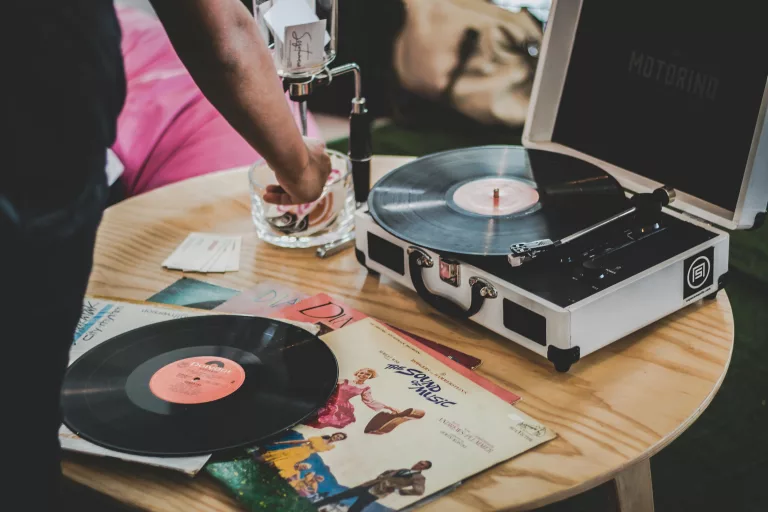SAMPLING


Sampling, a musical technique that has profoundly transformed the soundscape. It has become an essential pillar of modern musical creation.
This practice consists of taking portions of pre-existing sounds. Whether they come from recordings, vinyls, or other audio sources, to reuse them and integrate them into new compositions. In this article, we will delve into the fascinating history ofsampling.
The History of Sampling: From Surprising Origins to Digital Boom
The history of sampling goes back well before today’s digital age. The earliest incarnations date back to the 1940s and 1950s, where the pioneers of musique concrete, such as Pierre Schaeffer, were experimenting with the recording and manipulation of concrete sounds.
However, sampling as we know it today really emerged in the 1960s and 1970s: the advent of the first electronic equipment.
Analog sampling, using magnetic tapes and electronic devices, opened the way to innovative sound experiments. Artists like the pioneers of hip-hop began using loops of breakbeats from vinyl to create the rhythmic foundations of their songs.
The advent of digital sampling in the 1980s and 1990s greatly expanded the possibilities. Digital samplers have allowed artists to manipulate and combine samples with increased precision, opening the door to unprecedented creativity.
Limitless Creativity
Sampling is much more than a simple borrowing technique. It is an art that relies on the ability to reimagine and reinterpret sound fragments to create something new and unique.
Artists use sampling in a variety of ways, whether to create catchy melodies or construct complex soundscapes.
Some artists, such as the pioneers of hip-hop, have made sampling a form of expression in its own right. They transformed fragments of old recordings into innovative musical pieces, creating a distinct artistic language.
Artists of various genres, from jazz to electronic, have adopted sampling to push the boundaries of musical creativity.
The Impact on Contemporary Music
Sampling has left an indelible mark on contemporary music, influencing a multitude of genres and redefining the way we perceive musical creation.
Hip-hop, in particular, has been profoundly shaped by sampling, transforming samples of soul, of funk and jazz as central elements of this cultural movement.
Beyond hip-hop, sampling has also marked genres such as electronic, pop and rock.
Renowned producers and artists frequently incorporate samples into their works. This practice has contributed to the diversification of musical sounds and the creation of emblematic pieces.


Sampling and Legality: Legal Challenges
However, the world of sampling is not without controversy, particularly on the legal side.
The copyright surrounding original recordings raises complex questions about the legality of sampling. Notable litigation has arisen over the years, with some artists fiercely defending their rights, while others maintain that it is a legitimate form of artistic expression.
Sample licenses and clearance agreements are often required to legally use samples. This has led to situations where entire albums have been delayed or tracks changed due to copyright issues.
Many artists therefore continue to view sampling as an essential way to create a connection with the musical past while innovating for the future.
The Future of Sampling: Between Technology and Creativity
With the constant advancement of technology, sampling is constantly evolving. music production software now offers advanced features for manipulating samples. This allowsartists to push the boundaries of creativity even further.
The democratization of music creation tools has also opened the way to new talents who explore sampling in innovative ways.
The future of sampling lies in the balance between technology and creativity. As tools become more sophisticated, artists have the opportunity to create unique sonic experiences.
However, legal challenges remain, prompting the music community to consider solutions that enable creative use of samples while respecting the rights of the original creators.
The Ethics of Sampling: Between Inspiration and Respect
Beyond the legal aspects, the ethics of sampling plays a crucial role in the debates surrounding this technique. Some consider sampling to be a form of musical homage, a way of honoring and drawing inspiration from existing works.
On the other hand, critics believe that sampling can sometimes be perceived as cultural appropriation.
The question of ethics raises important questions about the responsibility of artists towards the original creators and the communities from which the samples come.
Debates around the ethics of sampling invite deeper reflection on how artists can reconcile the search for inspiration with respect for the sources that inspire them.
Technological Innovation: Revolutionizing Musical Creation
Technological innovation continues to reshape the sampling landscape.
Artificial intelligence and sound processing algorithms open up new perspectives by allowing artists to generate original samples or to transform radically from existing sounds.
This new technological frontier raises questions about authenticity and originality.
Navigating the Legal Mazes
One of the most complex aspects of sampling is issues of intellectual property. legal disputes around sampling are legion.
This highlights the tension between artistic creativity and the rights of the original owners of the sampled recordings. The evolution of copyright laws and court decisions significantly influence the way artists approach sampling.
Navigating the legal mazes of sampling involves understanding the nuances of copyright, fair use and licensing.
Artists must be aware of potential risks and make informed decisions about the legality of their creations. This raises essential questions about artistic freedom and the limits of copyright.


Conclusion
In conclusion, sampling therefore represents much more than a simple musical technique. It is an ever-evolving art form that has transformed the way we create and perceive music.
From humble beginnings in musique concrete laboratories to modern digital production studios, sampling has stood the test of time, leaving an indelible mark on contemporary music.
As artists continue to explore the endless possibilities of sampling, this creative technique continues to shape the future of music with limitless inventiveness.
